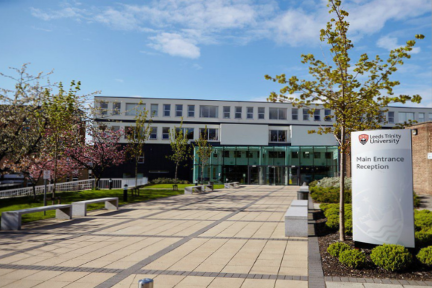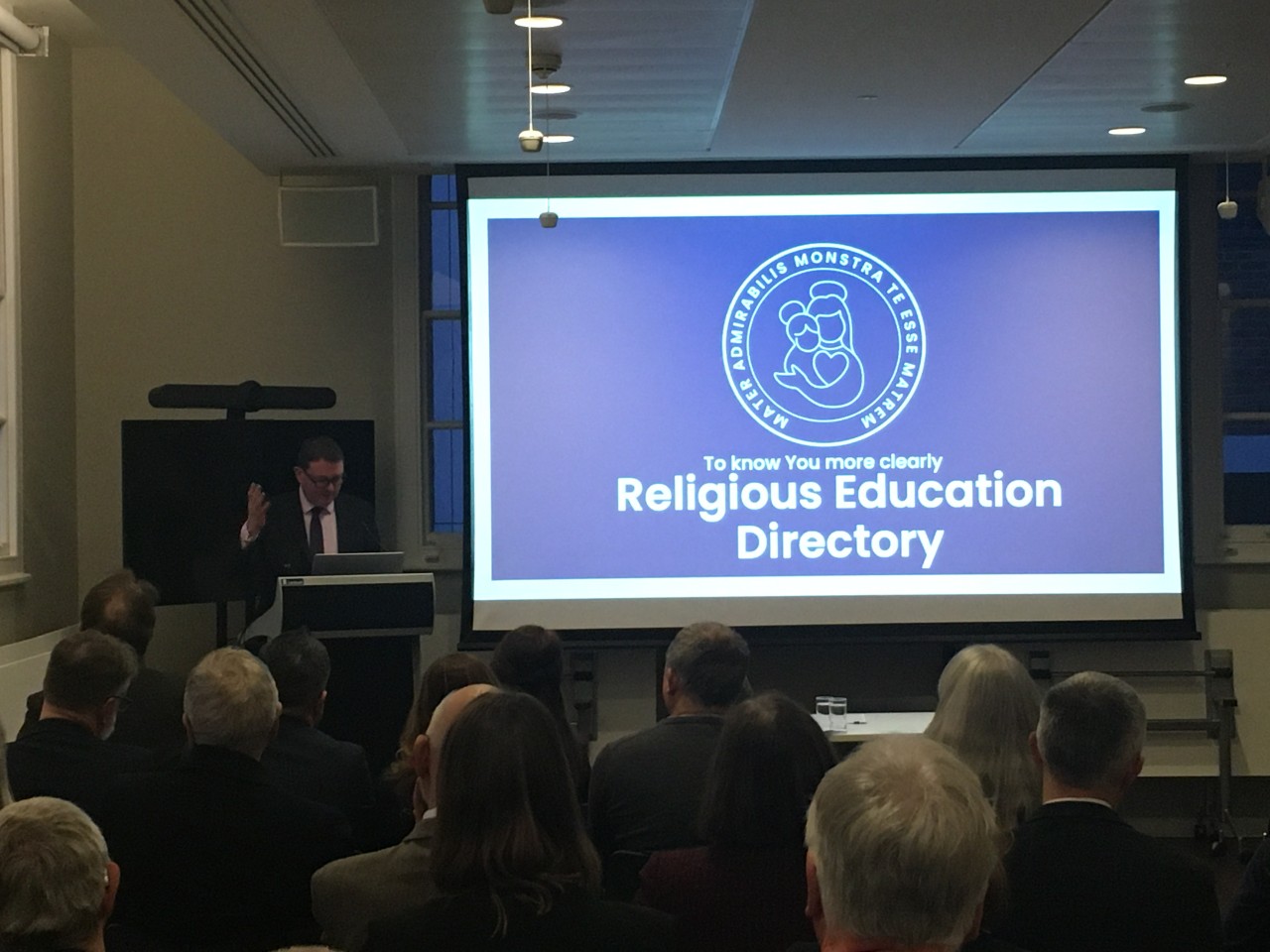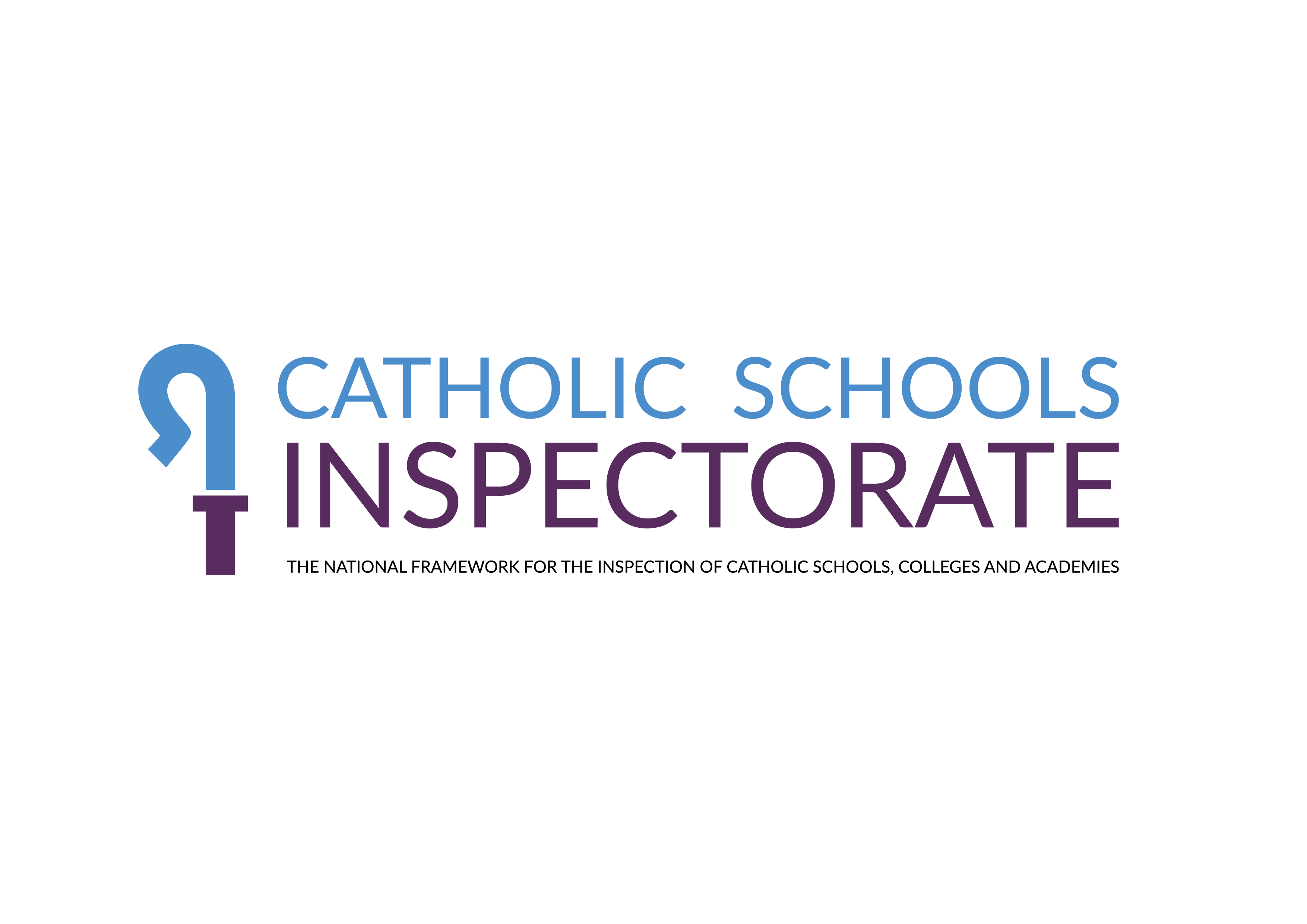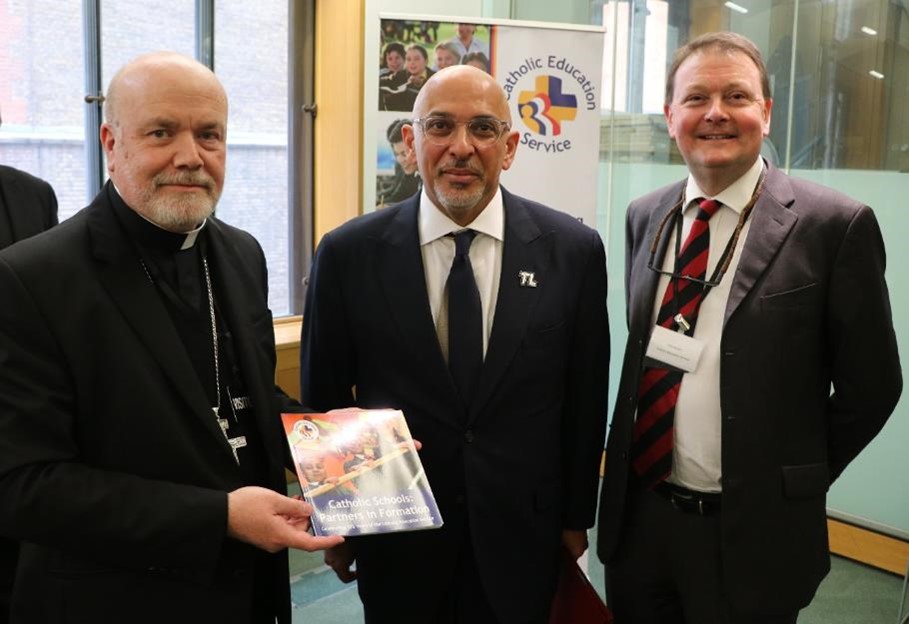CES News (156)
CES statement on The Bloom Review: does government ‘do God’?
Amid a national Religious Education (RE) teacher shortage we welcome The Bloom Review and its clear evidence that RE is vital for children and young people to learn.
RE is the core of the core curriculum and Catholic schools dedicate at least 10% of the timetable to this essential subject, while the Church’s RE curriculum and inspection framework are recognised as models of best practice.
There are 2,175 Catholic schools, colleges and academies across England and Wales, representing just under 10% of state education. Catholic pupils achieve the highest GCSE RE results in the country, and represent a quarter of all entrants. The past year has seen the launch of a new RE curriculum and national inspection framework to ensure that the quality of RE in all Catholic schools remains high. We are happy to share our Catholic approach to ensuring high quality RE to help improve RE teaching as a whole.
The Catholic Education Service is committed to continued working with the Government in support of Catholic education, high-quality RE and increased religious literacy in the Government and the wider public sector.
Catholic universities respond to post-pandemic alienation, injustice and market economics

Rehumanising a world of post-pandemic volatility is a theme running through a new, free online lecture series from a Catholic university.
Beyond The Dark Clouds, hosted by Leeds Trinity University from April to November, sees 12 lectures from UK and international contributors including a former government minister, centred around justice in contested issues such as the police, law enforcement, business ethics, spirituality, the arts and more.
The title is drawn from ‘dark clouds over a closed world’, a phrase used by Pope Francis in his 2020 encyclical Fratelli Tutti. In this the Pope refers to the ‘desensitised human conscience’ as among the chief causes of global crises, that “local conflicts and disregard for the common good are exploited by the global economy in order to impose a single cultural model...the advance of this kind of globalism strengthens the identity of the more powerful.”
Positioning Catholic higher education as a platform to return religious tradition and thought to public debate, the series features talks on policing, from the internationally renowned Dr Tobias Winright, Professor of Moral Theology at St Patrick’s Pontifical University, Ireland, and from former Chief Superintendent Tony Blockley, now Head of Criminology and Policing at Leeds Trinity University.
Economics, justice and Catholic social teaching are addressed by Philip Booth, Professor of Public Policy at St Mary’s University; and former Labour government Trade and Industry, and Foreign and Commonwealth Affairs minister, Sir John Battle, discusses the Church in the wider, secular, world.
Each lecture is recorded and then uploaded as a podcast to both Spotify and Apple.
Professor Charles Egbu, Vice Chancellor of Leeds Trinity University, said: “We are pleased to have the participation of such a prestigious line-up of speakers for our lecture series, and look forward to discussing some key social issues affecting communities today and how the Catholic university can be a vehicle for change and progress.”
Dr Ann Marie Mealy, Director of Catholic Mission at Leeds Trinity University, said: “Much of the suffering and alienation that people felt during lockdown has not yet been acknowledged fully or discussed openly, and we should acknowledge the need for healing more.
“Many of us at Leeds Trinity share the Church’s desire to get involved in public discussions about how to humanise our world, and to bring about the conditions that enable the flourishing of all individuals and groups – please join us.”
Find out more - to register for attendance, please contact Ця електронна адреса захищена від спам-ботів. Вам необхідно увімкнути JavaScript, щоб побачити її.
New Religious Education Directory launched by CES
 A new Religious Education (RE) Directory for Catholic schools, colleges and academies in England and Wales has been launched at an event in Westminster.
A new Religious Education (RE) Directory for Catholic schools, colleges and academies in England and Wales has been launched at an event in Westminster.
The directory was introduced at Cathedral View on 25 January by speakers including Dr Margaret Carswell, Senior Lecturer at the Australian Catholic University; Baroness Barran MBE, Parliamentary Under Secretary of State at the Department for Education; the Rt Rev Marcus Stock, Bishop of Leeds and Chairman of the Catholic Education Service (CES); and Paul Barber, CES Director.
Titled To Know You More Clearly the directory sets out the purpose of RE from Early Years Foundation Stage to Year 9 and features a programme of study with a model curriculum, corresponding to the six half-terms of the school year.
The new directory replaces previous editions published in 1996 and 2012, and states that RE is to be taught for at least 10% of curriculum time up to age 16 in Catholic schools and academies, and 5% in sixth forms.
It was drafted by experts including the late Professor Anthony Towey, Head of Theology, Philosophy and History at St Mary’s University; CES Religious Education Adviser Philip Robinson; Senior Policy and Education Adviser Dr Nancy Walbank; and representatives of the Association of Teachers of Catholic Religious Education and the National Board of Religious Inspectors and Advisers.
Based on the constitutions of the Second Vatican Council and rooted in the Catechism of the Catholic Church, the objective of the curriculum is religiously literate and engaged young people, with the knowledge, understanding and skills to reflect spiritually, think ethically and theologically, and recognise the demands of religious commitment in everyday life.
In his preface, Bishop Marcus writes: “As well as seeking to assist parents with the education and religious formation of their children, Catholic schools strive also to be of service to society. Religious education plays its part in this endeavour by enabling all pupils to be confident and secure in their religious faith and knowledgeable and respectful of other religions, and so play a crucial role in building a cohesive society.
“This new edition of the Religious Education Directory strives to embody these inspiring objectives.”
Baroness Barran thanked those present and highlighted “the important role Catholic schools, and schools with a religious character more generally, play in giving children a moral compass, guiding them with values that will be integral not only through their school journey, but beyond that into adulthood, into the workforce and into society.”
Other attendees at the launch included Schools Commissioners from the Catholic dioceses; and representatives from the Church of England Education Office; Board of Deputies of British Jews; Religious Education Council; National Association of Standing Advisory Councils of Religious Education; Culham St Gabriels; Catholic Union; and from the London Jesuit Centre.
While nurturing the faith of Catholic pupils, the curriculum prepares all pupils to play their part as critical citizens in a plural and diverse culture. It develops in them a dialogical attitude, through the content that is presented and through the modelling of respectful dialogue in class, a particularly powerful witness in a context where social media has had such a detrimental impact on the civility of public discourse.
Topics covered include the relationship between faith and science; the problem of evil; nature of human freedom; rights of the unborn; plight of refugees and asylum seekers; war and peace.
There is also a focus on the beauty of Catholicism and its influence on culture through art, music, literature, science, and architecture, equipping young people to engage with the Church beyond intellectual remits, and approach the transcendent.
A series of training workshops on the directory and model curriculum for dioceses are also being planned to take place throughout the year.
Pope Emeritus Benedict XVI Requiescat in pace
 Cardinal Vincent Nichols, speaking shortly after the Requiem Mass in St Peter’s Square for Pope Emeritus Benedict XVI, described the funeral as in one way “a straightforward celebration of a Funeral Mass,” in another way, a uniquely historical event “of great emotional depth and stature.”
Cardinal Vincent Nichols, speaking shortly after the Requiem Mass in St Peter’s Square for Pope Emeritus Benedict XVI, described the funeral as in one way “a straightforward celebration of a Funeral Mass,” in another way, a uniquely historical event “of great emotional depth and stature.”
The Requiem Mass, presided over by Benedict’s successor Pope Francis, took place on Thursday morning, 5 January, after almost 200,000 pilgrims had paid their final respects to the Pope Emeritus during a period of his lying in state for the previous three days.
Cardinal Nichols said he was collecting his memories of Pope Benedict during the Mass and considered his last homily before retiring as pope.
In it, Benedict used the image of Jesus asleep in the back of the boat when the storm came on the Sea of Galilee and the disciples were frightened.
The Cardinal repeated Archbishop Georg Gänswein’s recollections:
“He said, Benedict used to say, ‘but now Jesus never sleeps and he’s always with us.’ So during the Mass I was thinking about those things and, quite simply, how lovable Benedict was and therefore thanking God for the gifts that He gave us through him.”
The Bishops' Conference of England and Wales website has further details on the life of Pope Emeritus Benedict XVI, including of his Papal Visit to the UK in 2010, as well as reflections on his funeral, Pope Francis' homily, and prayers prepared by the Liturgy Office.
Rigorous new National Inspection Framework takes effect in Catholic schools
 The Catholic Schools Inspectorate (CSI), which brings together the diocesan school inspectors of England and Wales into one body, recently started its inaugural work of inspecting Catholic schools.
The Catholic Schools Inspectorate (CSI), which brings together the diocesan school inspectors of England and Wales into one body, recently started its inaugural work of inspecting Catholic schools.
It acts under the new National Inspection Framework which was agreed by the Bishops earlier this year.
The CSI and National Inspection Framework have been developed with the support of the Catholic Education Service (CES) and the National Board of Religious Inspectors and Advisors (NBRIA).
Catholic schools have been subject to inspection frameworks set by the Bishops ever since the Catholic dioceses were first restored in 1848.
The CSI and new National Inspection Framework aim to improve the rigour, consistency, objectivity, oversight, and accountability of inspections.
The CSI logo takes as its logo the bishop's crosier, which is a symbol of his pastoral office. Inspection is one of the ways the bishop acts as a 'good shepherd' to his schools.
The different parts of the crosier have traditionally been interpreted in ways that reflect the ways this care will be evident in the inspection process. The curve of the crosier directs the straying back onto the right path; the pointy end prods those who are stuck and prompts them to get moving; and the bar between the two supports all the rest.
Pupils, parents, teachers, inspectors, and generations to come will benefit from the CSI and the new framework which advance the Catholic mission of Catholic schools.
Statement on the Government White Paper
Paul Barber, Director of the Catholic Education Service said: “As the country’s second largest provider of schools and as a long-standing Government partner in the provision of education, we welcome the principles set out in today’s white paper.
“This country has a strong tradition of providing a dual system of both State and Church maintained schools. This approach has for generations provided parents, who are the primary educators of their children, with genuine choice in the education system. We therefore look forward to working with the Government to ensure that the continuation of this dual system is a core part of any future legislation.
“Furthermore, we also look forward to working with our partners in the Department for Education to ensure that the legal structures outlined in the white paper are fit for purpose for England’s 2000 Catholic schools.”
Statement on the incident at the John Fisher School, Purley
“Catholic schools welcome pupils from all backgrounds. This isolated incident has given a false impression of the inclusive nature of Catholic schools.
"Catholic schools are places where all children can flourish and as such have a zero-tolerance approach to LGBT+ discrimination. Nationally the CES has worked closely with schools, dioceses, and charities to produce Catholic inclusivity guidance and resources for schools that have won acclaim from LGBT+ organisations.
"We would encourage Catholic schools to work closely with their diocese to ensure that all Catholic schools can be welcoming and inclusive centres of learning where everyone is respected as a human being made in the image and likeness of God.”
Update: statement from the Archdiocese of Southwark
“At the heart of every Catholic school sits the person of the Lord Jesus Christ and the teachings of the Catholic Church.
"We expect all Catholic schools to remain faithful to the Church’s teaching on the truth and dignity of the human person. This teaching should never give cause to foster a culture of bigotry or intolerance.
"In fact, hatred and discrimination is itself contrary to Church teaching as it fundamentally disrespects the God-given dignity of each human life.
"Any impression that the John Fisher school is anything other than an inclusive centre of learning that allows young people to flourish is deeply regrettable. The Archdiocese acted to ensure the material put in front of the children was age-appropriate.
"We are continuing to work with the John Fisher School moving forward.”
Holy Father receives milestone booklet on Catholic schools in England and Wales
 Marking the 175th anniversary of the founding of the Catholic Education Service (CES), Pope Francis has gratefully received a copy of the CES’s latest publication Catholic Schools: Partners in Formation.
Marking the 175th anniversary of the founding of the Catholic Education Service (CES), Pope Francis has gratefully received a copy of the CES’s latest publication Catholic Schools: Partners in Formation.
The booklet – which includes an overview of Catholic schools in England and Wales – reflects on the distinctive nature of Catholic schools and on why the Church provides them.
It was presented to the Holy Father in the Vatican by CES Director Paul Barber, in his capacity as President of L’Office International Enseignement Catholique (OIEC).
The booklet has already received warm welcome by UK Parliamentarians earlier in the year, at an event which saw the guest of honour, Education Secretary the Rt Hon Nadhim Zahawi, recognise the tremendous value of Catholic education across the country.
The chapters are illustrated with case studies of schools, teachers, parents, and alumni, which offer compelling testimonials of the Catholic ethos in action. In the famous words of Pope Francis, which the case studies testify to, “educating is an act of love; it is like giving life”.
Paul Barber, CES Director, said: “It was an honour to share the milestone of the 175th anniversary of the CES with the Holy Father, who understands the crucial presence and distinctive nature of Catholic schools. The testimonials contained within this booklet offer a small glimpse into the many good fruits of the Catholic ethos in schools in England and Wales, which we hope he will enjoy reading.”
The Catholic Church is currently the second-largest provider of education in England and Wales, with 2,200 schools, 850,000 pupils and 50,000 members of staff, and four universities. Educating more than a quarter of a million non-Catholics and with a pupil population significantly more ethnically and socially diverse than the national average, Catholic schools maintain their strong track record of being at the service of all.
The booklet concludes with an optimistic outlook for Catholic schools in England and Wales, for their next 175 years of forming well-rounded young people and contributing the highest standard of virtues-based education to the common good.
‘Proud to call you my partner’ – Education Secretary tells Catholic educators

Speaking to a gathering of Catholic educators in Parliament on Wednesday (23 February), the Secretary of State for Education, the Rt Hon Nadim Zahawi MP said he was ‘proud to call’ the Catholic Church a ‘partner’ in the provision of education.
The event was hosted by Conservative MP Mary Robinson and was celebrating the 175th anniversary of the founding of the Catholic Education Service (CES).
To mark the occasion the CES also used the opportunity to launch a new publication entitled Catholic Schools: Partners in Formation. The book gives a brief overview of the history of Catholic education in England and Wales as well as a reflection on why the Church continues to provide Catholic schools with their distinct ethos.
A copy of the book was presented to the Secretary of State by the Rt Rev Marcus Stock, Bishop of Leeds and Chairman of the Catholic Education Service.
The event was attended by more than 100 guests including representatives from Dioceses, Catholic universities, and other Catholic educational institutions.
Also in attendance was Amanda Spielman, Chief inspector of Ofsted, the Children’s Commissioner, Dame Rachel De Souza, representatives from the DfE, MPs (including the Rt Hon Jacob Rees Mogg) and members of the House of Lords.
In his speech to the assembled guests Bishop Marcus Stock said: “When it comes to being partners, the Catholic Church was the first provider of schools in England.
“Today with 2,200 schools, 850,000 pupils and 50,000 members of staff, and four universities, it is the second-largest provider of education in our country. This is an incredible achievement, and represents one of the most successful Government partnerships, in the delivery of such an essential service as education and schooling.”
Responding to the bishop in his speech the Rt Hon Nadim Zahawi MP said: “I am extremely grateful to be given an opportunity to speak to you all in person at this important event to celebrate 175 years of the Catholic Education Service.
“175 years is a significant achievement, so I just want to thank everyone in the room, and of course colleagues here who are so supportive of this extraordinary human endeavour and recognise the incredible valuable work that you do and have done and continue to on behalf of so many young people and staff in school across our country.
“You deserve high praise, since many of your schools serve some of our most diverse and disadvantaged communities where the challenges include reaching out to those families where neither parent may be in work or those for whom English is a second language - as it was for this Secretary of State.”
The Secretary of State concluded his speech by saying, in reference to the Catholic Church’s historic roll as a provider of schools that he was “proud to call [the Church] my partner”.
Pictured are The Rt Rev Marcus Stock, the Rt Hon Nadim Zahawi, and Mr Paul Barber (CES Director)
COP26: Catholic schools and colleges forming the next generation of stewards of God’s creation
By The Right Reverend Marcus Stock, Bishop of Leeds, Chair of the Catholic Education Service, and The Right Reverend Bishop John Arnold, Bishop of Salford, Lead Bishop for the Environment
As we near the end of the first week of the COP26 UN climate summit, two Catholic bishops have issued a statement lauding the action and commitment of Catholic school pupils in their response to the ecological crisis.
Bishop Marcus Stock, Chair of the Catholic Education Service, and Bishop John Arnold, Lead Bishop for the Environment, acknowledge that it is young people that will have to live with the long-term impacts of the climate crisis but, equally, they are at the heart of the Church’s response:
“In Laudato Si’ Pope Francis asks us the key question, ‘What kind of world do we want to leave to those who come after us, to children who are now growing up?’ This is a profound question which gets to the heart of why the environmental crisis matters and the pressing need for us as a global community to reverse climate change.
“Ultimately our young people are the future, and it is they that will have to live with the long-term ramifications of the ecological crisis. However, it is also the young who can have the most impact in delivering the changes we need to address the climate emergency. That is why one of the most striking elements of the public’s response to the climate and ecological crisis, especially in the run up to the COP 26, is that it has been energised by the participation of children and young people.
Contemplative, active and prayerful response
“It has been really encouraging to see hundreds of thousands of young Catholics across the country get involved with projects that care for our common home, especially in our network of Catholic schools. We know that our pupils care passionately about this topic and many schools have embedded Pope Francis’ words and intentions from Laudato Si’ and Fratelli Tutti into their wider school curriculum.
"In this way, the response to the ecological crisis by our young people can be both contemplative and active, but also rooted in prayer and in the teachings of the Church.
“Fundamental to Catholic education is the principle of the formation of the whole person and therefore it is right that Catholic schools are forming the next generation of the stewards of God’s creation.”


